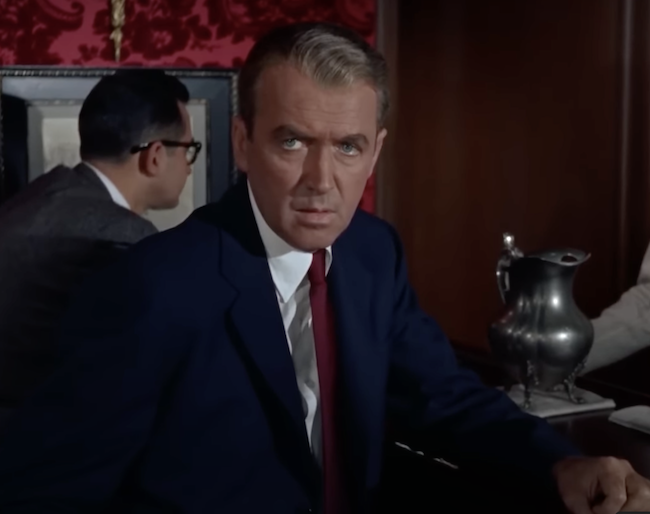
Spoilers abound.
I love a good casting against type. That’s why Scottie in Vertigo is so disarming: It’s creepy to find America’s aw-shucks sweetheart, Jimmy Stewart, playing a villain.
Of course, not all of Stewart’s parts are sugary; he was a murderer in The Thin Man series. He was a professor with disturbing philosophical beliefs in Rope. But Stewart plays innocence beautifully and so memorably—as in his iconic performance in Mr. Smith Goes to Washington, or in his role opposite an imagined rabbit in Harvey. It’s in these parts—and as the lovely George Bailey in It’s a Wonderful Life—that Stewart makes the most enduring impression on viewers.
That’s why when Scottie begins to act unhinged in Vertigo, the audience gives him the benefit of the doubt, and can understand why his loves do too.
He’s just in grief, we think. It must be awful to blame yourself for your coworker’s death.
He’s just experiencing PTSD.
I know he must be a good guy…He’s George Bailey!
Scottie seems to be a good guy at first. He’s a charming, funny friend to Midge (Barbara Bel Geddes), who secretly loves him. He’s willing to help desperate college friend, Gavin (Tom Helmore). Gavin claims his wife, Madeleine, is possessed by a sad ghost and employs Scottie to trail and protect her from self-harm.
But right away, Scottie’s actions are suspect. He falls for Gavin’s wife. I mean, it’s hard to blame him. Look at her entrance:
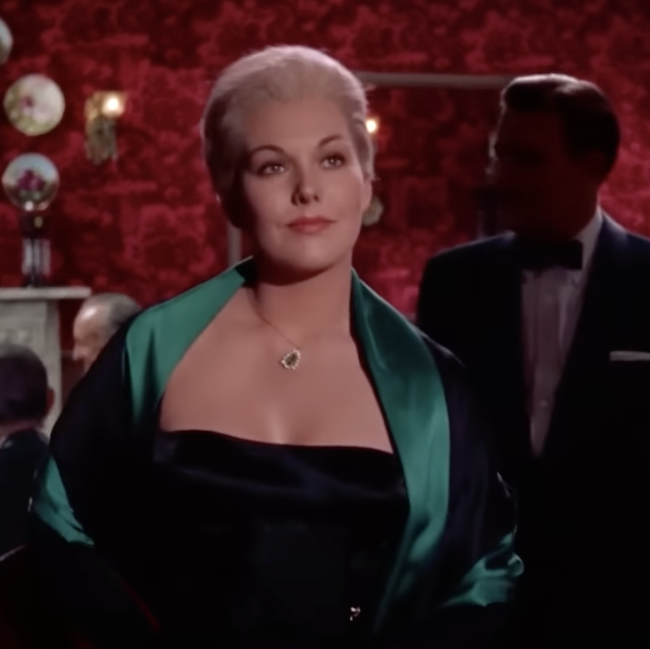
She somehow looks even better in a rather drab grey suit:
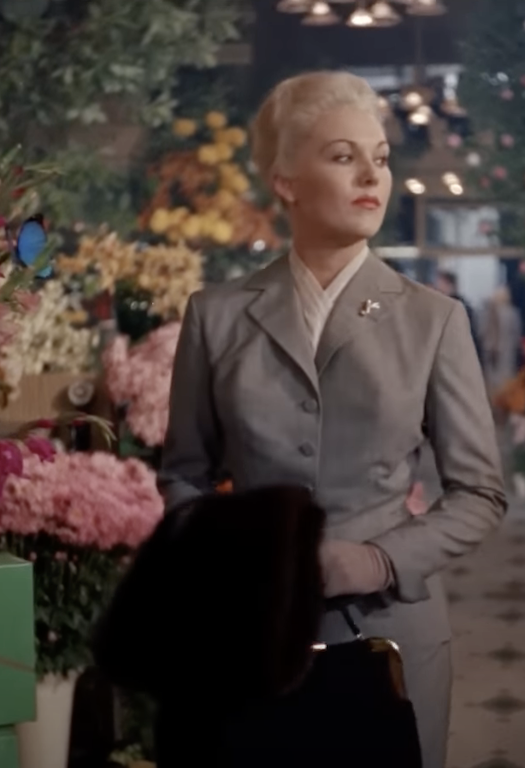
Still, Scottie didn’t have to act on his attraction. He breaches friendship and professional ethics by hitting on Madeleine. Knowing—as we viewers do by the end—that Gavin planned it that way doesn’t change anything.
For a brief moment, Scottie and Madeleine seem to enjoy each other’s company, but the happiness is short lived.
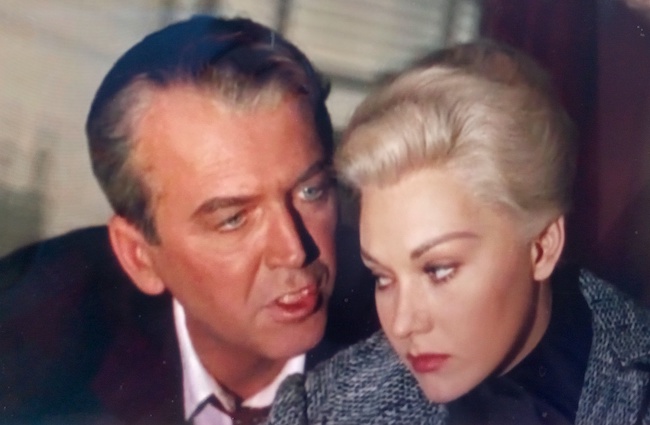
Soon, things go terribly wrong for Scottie. Madeleine leads Scottie to a tower. His vertigo prevents him from following her, and he thinks he sees her leap to her death. What he really sees is the real Madeleine (whom he never met) thrown from a tower, while fake Madeleine, whom he’s been trailing (Novak), hides until he leaves.
Once Scottie loses fake-Madeleine to supposed suicide, we’ve forgiven him for any bad behavior. After all, look at his despair!
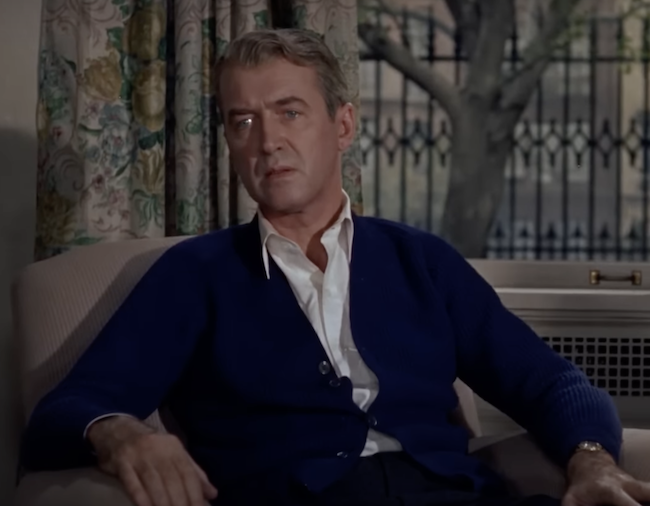
It’s what he does with that despair that makes Scottie a villain.
First, he follows a strange woman, Judy, to her apartment door.
Let’s start there. Stalking a woman because she looks like your lost love is deranged. Her hostile response to his knock is valid—even if she weren’t the fake Madeleine we know her to be.
Of course, Judy is hardly innocent. She was involved in a murder plot that ruined Scottie’s life. Despite her complicity, we feel for her. She’s so remorseful and almost as self-destructive as pretend Madeleine: who after such a perfect crime falls for her own mark? (Gavin would have killed her had he thought her capable of it.)
And Scottie? Had Scottie believed Judy guilty, his cruel behavior toward her would be somewhat justified. But Scottie believes her innocent. He’s an emotionally abusive boyfriend who feels ZERO guilt for expecting irrational sacrifices from his lover.
His next disturbing act post-stalking is to force Judy to wear the same grey suit as his dead love. When Judy realizes what he’s doing, she protests.
His justification for distressing her is jaw-droppingly awful: “Judy, Judy, it can’t make that much difference to you…. Judy, do this for me.”
I admit. I laughed aloud when I heard these words this time around. Can’t make any difference to YOU, what you wear? Yeah, nothing personal there.
“I don’t like it,” she says of the suit he offers her.
“We’ll take it,” he responds to the saleswoman.
Judy responds by laying her head on a desk in misery. Scottie’s answer? Ply her with liquor.
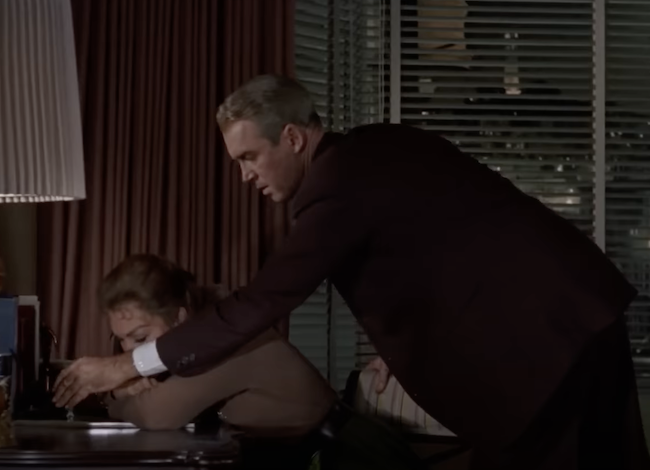
She asks why he’s terrorizing her and threatens to leave but fears he wouldn’t let her. Sadly, she wouldn’t leave anyway: she wants to remain with her abuser.
This is when we wish Judy’s friends from an earlier scene would return.
RUN, HONEY. RUN!!!!!!
Scottie then says his last few days with her (and yes, he starts on this nonsense just DAYS after they get together) are the first happy ones in a year.
She says that’s only because she reminds him of his dead love. What, besides that, does he like about her?
He replies, “It’s you too. There’s something in you that…” He starts to touch her, then WALKS AWAY without finishing the thought. Because she’s right: he only likes her for her resemblance to Madeleine.
“You don’t even want to touch me,” she says.
“Yes, yes I do.”
Let it be said that there’s no evidence to back his words.
“Couldn’t you like me, just me, the way I am?” Judy cries.
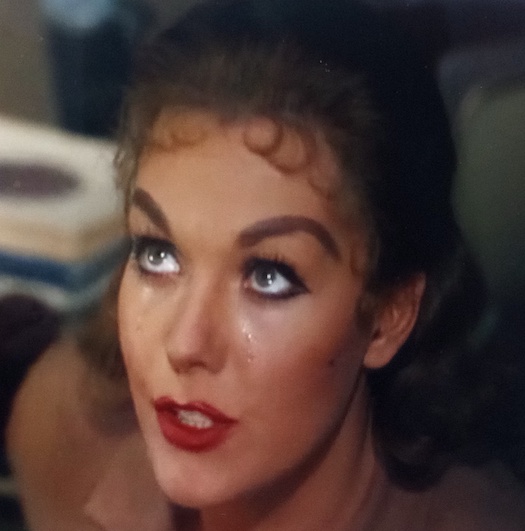
Now this is some heartbreaking stuff. But it gets worse:
“When we first started out,” Judy says, “it was so good, w-we had fun. And then you started in on the clothes, well, I’ll wear the darn clothes, if you want me too, if, if you’ll just, just like me.”
What is his response to this pathetic concession?
“The color of your hair.”
Because of course, he wants to change her brown hair into Madeleine’s blonde locks too.
“Oh no!” she says and walks away.
“Judy, please, it can’t matter to you.”
Again, as a woman, I must say, the color of one’s hair is QUITE PERSONAL.
But Judy is now ignoring red flags as tall as the sequoias she visited with him (while acting as Madeleine): “If…If I let you change me, will that do it? If I do what you tell me, will you love me?”
“Yes, yes,” he says.
“Then I’ll do it. I don’t care anymore about me.”
Her sad words don’t worry him, or even make him feel remorse. Because she caved to his senseless demands, he is finally affectionate, nuzzling her, “Here, go on, let’s sit by the fire,” and he takes out a cushion for her.
And so Judy makes the full transformation into his lost love for him.
We hear the elevator after the full makeover, watch her move toward him. She enters the room without a word, hesitant. She’s afraid. She puts her purse down.
“Well?” she says, turning toward him.
It’s clear that Judy is expressing one tiny rebellion, one last trace of self-respect. She comes back with her hair down, not up, like Madeleine’s. In every other way, she’s the dead woman’s twin.
“It should be back from your face and pinned at the neck,” says Scottie, “I told her [the beautician] that, I told you that.”
Wow.
“We tried it. It just didn’t seem to suit me,” she says, combing her hair nervously.
He grabs her hair.
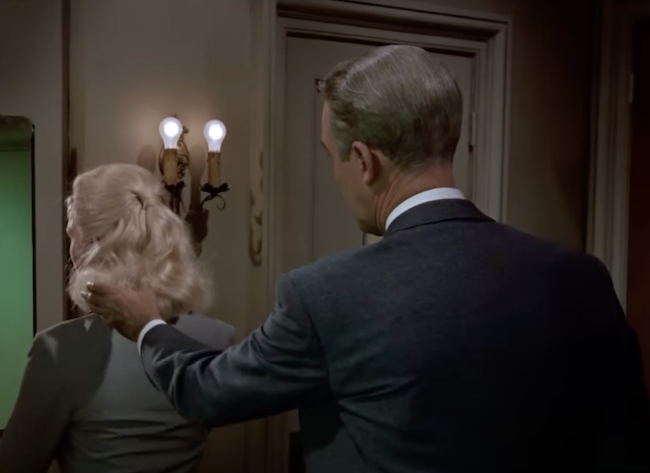
She turns to face him.
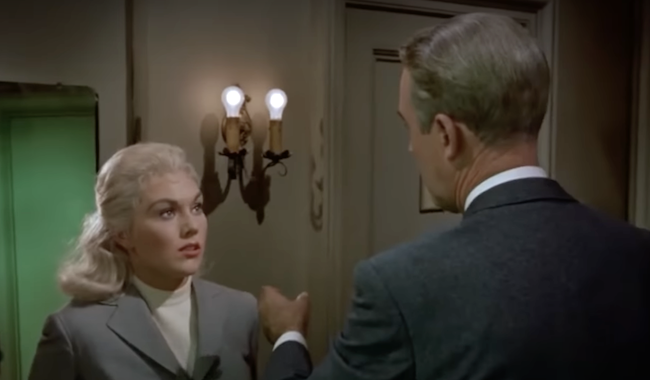
“Please, Judy,” he begs.
She walks in other room, fixes it for him.
He sees her in fog as she somnolently walks toward him. She half-smiles, then smiles fully as she sees his tears.
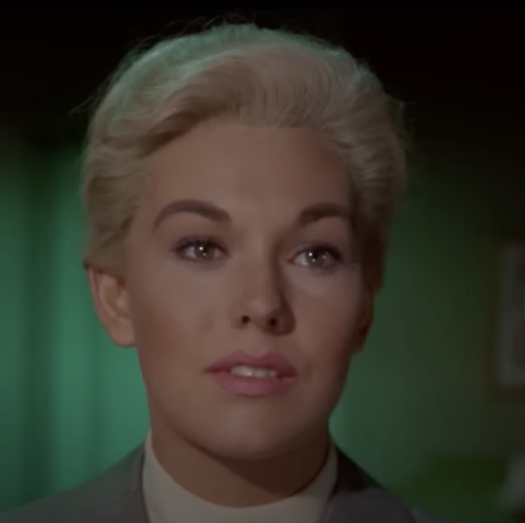
Being the toxic man he is, he gives her a REAL kiss. After all, she’s now actually BECOME his dead love for him. Because that’s healthy.
In the next scene, we see them playful and flirty with each other—an echo of the earlier conversation with Midge, but with heat.
“Hello, my love. Like me?” She smiles and then spins for him in a pretty dress, her air and voice confident, easygoing—the tone of a well-loved woman. This is the first genuine smile we’ve seen from Kim Novak in the film. (Scary, right?)
“Mmmm,” he responds.
“Is that the best you can do?”
“Come here.”
“Oh no, you’ll muss me.”
“Well, that’s what I had in mind. Now come here.”
He then spots Madeleine’s necklace on her neck and knows Judy’s guilt. He says cryptically, “One final thing I have to do, and then I’ll be free of the past.”
Scottie drives Judy to Madeleine’s supposed suicide tower. He forces her up the stairs and through the trap door.
Then he attacks and half-strangles her, saying, “He [Gavin] made you over, didn’t he? He made you over just like I made you over, only better. Not only the clothes and the hair, but the looks and the manner and the words and those beautiful, phony trances….Did he train you, did he rehearse you, did he tell you exactly what to do, what to say? You were a very apt pupil too, weren’t you?”
It’s easy to read these words on multiple levels. Yes, he’s angry she deceived him and furious she’s taken advantage of his affliction. But he’s also angry that she’s had a former lover, Gavin. And he’s angry that Gavin was a better Geppetto than he was.
Scottie’s physical actions are brutal now that he knows what Judy’s done, but those actions are just an escalation of earlier ones.
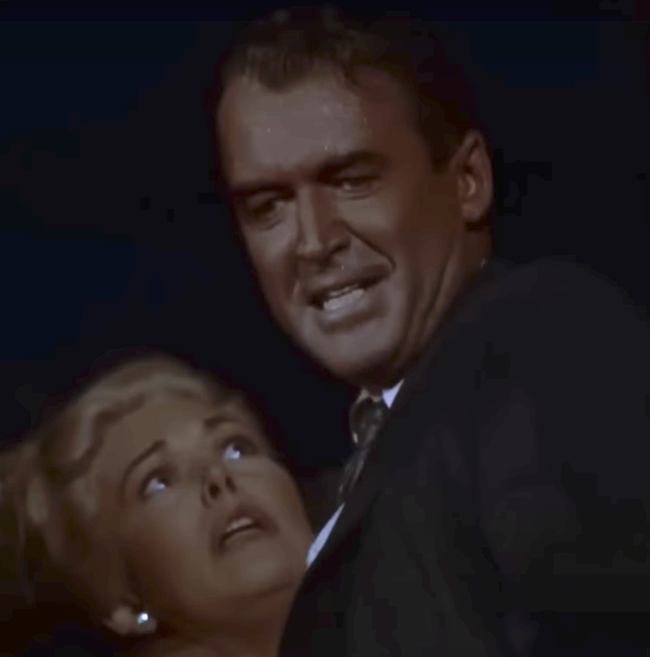
Note how many times he pins Judy’s arms throughout this story, how many times he forces her from behind—whether it is to wear the clothes he wants, or to go up to a tower where her death awaits. Observe how many times she looks fearful, hesitant, unsure of herself. She is a victim of his cruelty, just as he has been a victim of the murderous plot.
Jimmy Stewart’s Scottie is the definition of a boyfriend who should make a woman run. If he doesn’t give you the heebie-jeebies in Vertigo, you’re just not paying attention.
This post is part of the beast blogathon from the Classic Movie Blog Association. See great entries here!

Reading your insightful and hilarious commentary on everyman actor Jimmy Stewart’s fall from grace – his dark character Scottie in Vertigo did give me the heebie jeebies! That role and Hitchcock’s film, always gives me a cause to shudder and your faithful description really brought it back to me! Thanks so much for joining in Blogathon & the Beast! Cheers, Joey
Thank you so much! It was a lot of fun.
I have to admit that Vertigo is one of those much-loved and acclaimed films that I just never warmed up to — partially because I don’t quite understand the plot. But I really enjoyed your review, Leah. It makes me want to give this film one more try.
— Karen
Thanks, Karen! I can understand that. It’s still not my favorite Hitchcock, but I find it fascinating.
Loved your post. I love this film so much – precisely because Stewart is so obsessed. And speaking of Jimmy – I do have a few issues. I know he’s supposed to be such a good guy, but I find him frequently kind of mean. Take The Philadelphia Story – he really is nasty to Kate a lot. And Rear widow – what is Grace doing there? And even his George Bailey – a prickly sort of guy.
You’re so right! He is prickly in It’s a Wonderful Life, kinder to Grant than to her in Philadelphia Story (I have so many issues with that film), and a selfish jerk in Rear Window. What is she doing there? Exactly!
Excellent analysis of the creepy James Stewart in this movie. I nearly spewed my glass of water all over my keyboard when you kept pointing out the “it can’t matter to you” argument.
There’s a lot to admire in this film, but I’ve never warmed up to it, and it’s because Stewart’s character gives me the heebie jeebies.
LOL. My exact reaction. He’s hard to take!
Loved this. Yes, what could it possibly matter to you, to become a completely different person to please a manipulative obsessive? He’s so creepy and harmful because he’s stuck on controlling appearances and never sees past them.
Thank you. Perfectly put! Exactly.
You summed up exactly: first we think Scottie can’t be mean, until he starts behaving as a weird stalker. Great analysis of this character.
Greetings,
Le
Thank you, Le!
I really enjoyed reading your take on Scottie! And you are so right about how our preconceived visions of America’s Treasure Jimmy Stewart play out when we see him in varied roles. He’s a Bailey! 😁
VERTIGO happens to be one of my favourite films so I’m more partial to the characters. You were very correct in pointing out their faults, however. Even for Judy who kind of gets off of the hook for her involvement. I’ve never seen Scottie as a villain, per se, although I do think he is desperately mentally ill. This sharp downward spiral would have never happened had monstrous Gavin Elster not used him as a human guinea pig. He had a habit of wiping the floor with people, as evidenced by how he treated his wife and Judy. We, the viewer, are left analysing Scottie and Judy/Madeleines’s dysfunctional relationship all the while Gavin Elster is completely out of the picture and scot-free (no pun intended).
It’s true! And we never see him pay a bit for it. He is a much bigger villain than Scottie. But it IS funny how much we let Judy off the hook–primarily because she seems so unhappy. But then, so is Scottie.
well done! I love Vertigo and find something new every time I watch it, but it took me 4-5 viewings before I found a point of entry. your points are so well taken…I don’t know if viewers in 1958 were at all attuned to this abusive boyfriend stuff, would bet they weren’t, but it’s all right there up front and needs to be highlighted.
I admire Stewart for challenging his pre-WWII star persona in his post-WWII movies, it shows a willingness to take risks with his success for the sake of exploring other, less lovable characters.
In Rear Window, as you say, he’s no sweetheart, and in The Man Who Knew Too Much he drugs his wife to control her emotional reaction to finding their son has been kidnaped. Awful…but I admire divas like Davis, Crawford, and Stanwyck for playing bad, too. Gives them a chance not just to show their range but to be human even when it ain’t pretty.
You’re so right. He really took some risks and expanded his range. I hate when a talented actor just keeps picking the same role. Good for him for playing the villains too, and yes, Davis and Stanwyck especially were exceptional at that! (They’d also be willing to cut the glamour, which was harder for Crawford).
The CMBA Presents the 2023 Fall Blogathon: Blogathon & the Beast -
[…] Cary Grant Won’t Eat You — Jimmy Stewart in Vertigo […]